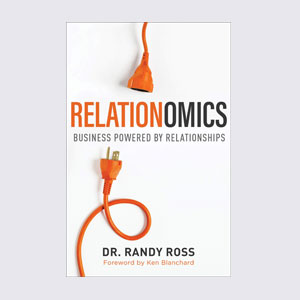
Relationships are essential to life and business success. In early 2019, Dr. Randy Ross discussed the value relationships in his newest book, Relationomics: Business Powered by Relationships. In a robust discussion with Dr. Ross, we talked about the values and purpose behind his latest book. In this conversation, he shares insights about modern business and practical applications of the value of relationships; and how they can help companies become more successful.
Ken Gosnell: In your latest book you discuss the value of relationships in business. Why did you write this book?
Dr. Randy Ross: We know that people flourish and organizations thrive in relationally rich environments. And one might think that practicing the principles that lead to healthy relationships would be common sense, but I can assure you that it is not common practice in most organizations.
 A recent Harvard Business Review survey revealed that 58 percent of respondents would trust a stranger more than their own boss. That alone speaks volumes as to the condition of relationships in the marketplace. It was my desire in writing Relationomics to provide some practical wisdom and the needed hope to untangle some of the biggest issues facing today’s business leaders, tomorrow’s workforce, and the future marketplace.
A recent Harvard Business Review survey revealed that 58 percent of respondents would trust a stranger more than their own boss. That alone speaks volumes as to the condition of relationships in the marketplace. It was my desire in writing Relationomics to provide some practical wisdom and the needed hope to untangle some of the biggest issues facing today’s business leaders, tomorrow’s workforce, and the future marketplace.
Did you know?
“Two thirds of Americans say they’ve lost more than 90% of the friends they had 10 years ago. Many Americans can only claim to have 2 close friends — maybe less. Why do most people have mediocre relationships — or none at all? Why are most people on track to never have great relationships?”
Ken Gosnell: Why do you think more businesses fail to understand the value of building relationships to grow their business?
Dr. Randy Ross: I find it fascinating that companies spend so much time, energy and resources on product development, manufacturing, and distribution. We focus on processes and efficiencies, eliminating waste and making the workflow seamless. However, we invest very little in the most essential part of the business—the people. Your people are your brand. They are the ones that interface with the client. They are the ones that manage the processes and the relationships that make everything else possible.
Ken Gosnell: You have written in previous books about how personal growth can help people become remarkable. You take this notion further in your latest book, to share how people need relationships to grow. Why are relationships so crucial to personal development?
“Maturity is marked by how well we play with others in the sandbox of life.”
Dr. Randy Ross: We can’t self-reflect to the point of seeing all of our weaknesses. That’s why we each have what we call “blind spots.” We are meant to live in community—in relationships with others that encourage us to move toward maturity. Maturity is marked by how well we play with others in the sandbox of life. Life was never meant to be a solo sport. Healthy relationships produce healthier and happier lives.
Ken Gosnell: Your focus on the fact that “humility breeds authenticity” is both powerful and challenging. Can you expound on that?”
Dr. Randy Ross: Good leaders are okay with the fact that they are a work in progress. They are comfortable in their own skin, no matter how freckled with failure it may be. They are not embarrassed by the truth that they’re not an expert on every subject. People who possess humility can genuinely celebrate the strengths of others. They empower others and celebrate their successes. They engender both trust and followers. They lead inspirationally.
Ken Gosnell: You write about giving do-overs to your team in this book. How do you know when you should give someone a do-over?
Dr. Randy Ross: Affording someone a second chance after a failure can provide an opportunity for growth like none other. Some of the things I look for when seeking to determine whether someone is worthy of a second chance is: Does the person acknowledge their failures; do they take responsibility for making things right; and, are they are quick to apologize. The more of these qualities they possess, the greater the likelihood that they will make the most of a second chance if it is offered.
Ken Gosnell: In Relationomics, you describe the idea of RAW conversations. Can you tell us more about the “RAW” process and why it’s useful?
Dr. Randy Ross: The most productive organizations are those that have been successful in creating open loops of continuous feedback. When these conversations become corrective, we call them RAW conversations.
RAW is an acronym, which stands for Reality, Advancement, and Wrestling. In these conversations, we seek to “state it as it is,” without hedging, spinning, or excusing. We try to advance both the issue and the relationship, moving in a forward and positive direction. And, we wrestle with possible solutions until the issues are resolved. Rather than attack each other, we join forces to effectively address the issues until we come up with a solution that is in everyone’s best interest.
Ken Gosnell: At CEO Experience, we teach leaders the value of the Golden Rule to CEOs. The Golden Rule states that you should treat others as you would like them to treat you. How important do you think the Golden Rule is for leaders today and why is this rule still valuable in today’s marketplace?
Dr. Randy Ross: Treating others as you would want to be treated is the essence of maturity. Unfortunately, we don’t always act in mature ways. That’s why I felt it necessary to write Relationomics.
The content will give you pause, allowing you to reflect on how well you are moving into others and how authentic you are being in relationships. When leaders share of themselves deeply, they gain faithful followers. And, when leaders lead well, relationally rich environments will be the result.
Relationships are valuable at every stage of business
Knowing the rules for a healthy relationship will help every business to grow. One practice that has always worked, and still works in today’s culture and community is The Golden Rule. This rule is as essential today for life and business, and it was when it was written. It has worked to engage employees and customers of all types of companies all over the world. The future of your business will depend on how well you manage the relationships within it.
Ken Gosnell is the CEO and Servant Leader of CXP (CEO Experience). He serves leaders by helping them to have great experiences that both transform them and their organizations that enable to go further faster. He has worked with hundreds of CEOs and leadership teams to enhance strategic, operational and people accomplishments. He is an author, coach, and strategic partner with CEOs. Ken is the creator and facilitator of the Christian CEO Linkedin Group and creator of the CEO Experience Impact Assessment. He is married to Shonda, and they have four children. Connect with @ken_gosnell on Twitter.
© YFS Magazine. All Rights Reserved. Copying prohibited. All material is protected by U.S. and international copyright laws. Unauthorized reproduction or distribution of this material is prohibited. Sharing of this material under Attribution-NonCommercial-NoDerivatives 4.0 International terms, listed here, is permitted.













